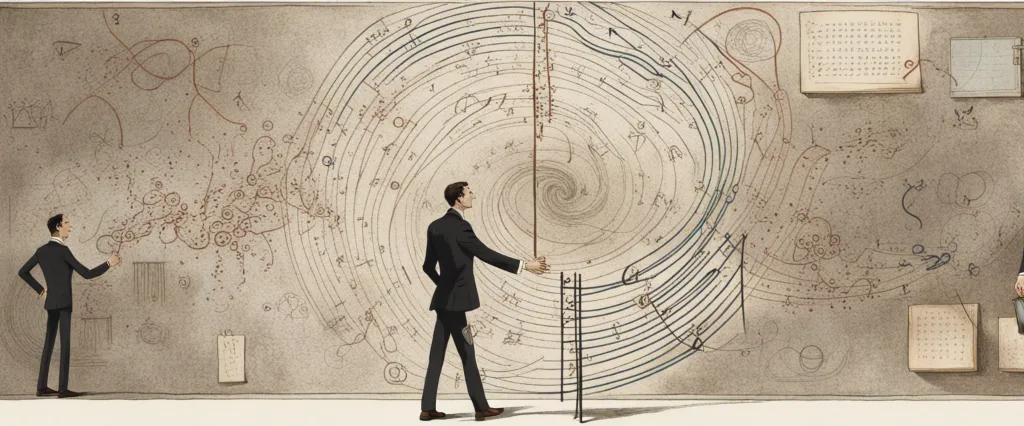——The Drunkards Walk by Leonard Mlodinow & Existentialism is a Humanism by JeanPaul Sartre

In the vast realm of human knowledge, individuals rarely traverse the same intellectual pathways. Exploring the realms of probability and chance, Leonard Mlodinow’s “The Drunkard’s Walk” and Jean-Paul Sartre’s “Existentialism is a Humanism” represent two distinct yet equally captivating corridors of thought. While one delves into the world of mathematics and the unpredictable nature of our lives, the other plunges into the depths of existential philosophy and the essence of human existence. Despite their apparent dissimilarities, these two texts share a common thread – an unyielding pursuit of understanding the intricacies of our complex reality. Within these pages, the juxtaposition of Mlodinow’s mathematical exploration and Sartre’s philosophical contemplation invites us to embark on a comparative journey, where we shall discern the intertwined relationship between the unpredictability of chance and the profound implications it holds for our existence. By analyzing the shared themes of uncertainty, decision-making, and human agency, we shall unravel the profound implications that these two intellectual works offer in understanding the enigma that is life itself.
Brief Summary of Two Books
The Drunkards Walk by Leonard Mlodinow
“The Drunkard’s Walk: How Randomness Rules Our Lives” by Leonard Mlodinow explores the intricate relationship between randomness, probability, and human behavior. Mlodinow takes readers on a fascinating journey through history, science, and personal anecdotes to reveal how randomness shapes our everyday lives.
The book delves into the concept of probability and dispels common misconceptions surrounding it. Mlodinow explains that our brains are wired to perceive patterns everywhere, even in the midst of randomness. He explores the nature of chance events, demonstrating that luck or randomness often plays a significant role in our successes and failures, regardless of our abilities or efforts.
Mlodinow explores numerous real-life examples to illustrate his points. He discusses the flawed judicial system, revealing how seemingly conclusive evidence can be misleading due to the power of randomness. Additionally, he delves into the worlds of gambling and sports to explain the role probability plays in these industries.
The author also investigates the impact of randomness on human decision-making processes. He highlights how our understanding of randomness can help us make better choices and avoid cognitive biases.
Throughout the book, Mlodinow emphasizes the importance of embracing uncertainty and acknowledges our tendency to seek explanations where none may exist. He encourages readers to appreciate the beauty and complexity of randomness, as it often shapes our lives in ways we may not initially comprehend.
In summary, “The Drunkard’s Walk” is an illuminating exploration of how randomness influences our lives. Mlodinow effectively combines scientific insights, historical examples, and engaging storytelling to challenge our perception of the world and uncover the hidden role of chance in our everyday existence.
Existentialism is a Humanism by JeanPaul Sartre
“Existentialism is a Humanism” is a philosophical treatise written by Jean-Paul Sartre in 1945. In the book, Sartre aims to clarify and defend his philosophy of existentialism. He begins by addressing the misconceptions and criticisms leveled against existentialism, emphasizing that it is not a pessimistic or nihilistic philosophy. Rather, existentialism recognizes the freedom and responsibility of individuals to create meaning and purpose in their own lives.
Sartre asserts that existentialism starts with the fundamental premise that existence precedes essence. This means that humans first exist and then define themselves through their actions and choices, as opposed to having predetermined essences or inherent natures. He argues that this view of human nature allows for complete freedom and responsibility, as individuals are not bound by any predetermined values or moral codes.
Sartre also discusses the concept of anguish, which arises from the awareness of our own freedom and responsibility. He posits that the existentialist perspective may induce certain anxieties, as individuals must face the burden of making choices without any guidelines or external reassurances. However, he argues that this anguish should not be seen as a negative burden, but rather as an essential part of human existence.
Furthermore, Sartre addresses the idea of bad faith, which refers to individuals avoiding their own freedom and responsibility by conforming to societal expectations or adopting predetermined roles. He criticizes those who deny their freedom, asserting that it leads to living an inauthentic and unfulfilling life.
Towards the end of the book, Sartre emphasizes the importance of valuing other individuals’ freedom as well, as it is inseparable from our own freedom. He asserts that our choices should not only consider our own desires but should also be made in consideration of the impact on others.
In summary, “Existentialism is a Humanism” serves as an elucidation and defense of Sartre’s existentialist philosophy, challenging the misconceptions and criticisms surrounding it. It promotes the individual’s freedom and responsibility to create his or her own meaning, while also emphasizing the importance of acknowledging others’ freedom and making ethical choices.
Comparison between Two Books

Similarities in Psychology
While both “The Drunkard’s Walk” by Leonard Mlodinow and “Existentialism is a Humanism” by Jean-Paul Sartre explore different disciplines, they do touch upon psychological aspects in their respective works. Here are some similarities regarding psychology present in both books:
1. Perception and Interpretation of Reality: Both books delve into how humans perceive and interpret reality through their own subjective lenses. Mlodinow examines the role of randomness and probability in decision-making, highlighting how people often misinterpret chance events. Similarly, Sartre stresses the idea that individuals construct meaning and interpret their experiences within their own existential framework.
2. Human Fallibility and Bias: Both authors recognize the inherent fallibility and biases of the human mind. Mlodinow explores cognitive biases and logical fallacies that influence decision-making processes, such as confirmation bias and the gambler’s fallacy. Sartre acknowledges how individuals are susceptible to self-deception, highlighting how people often engage in rationalizations and embrace false consciousness to avoid confronting their freedom and responsibilities.
3. The Influence of Social Factors: Mlodinow and Sartre emphasize the impact of social factors on human behavior and psychology. Mlodinow discusses the role of social networks and social influence in shaping individuals’ decisions. Sartre focuses on the idea that humans exist within a social context, where societal norms, expectations, and pressures can shape one’s sense of self and identity.
4. The Role of Consciousness: Both authors touch upon the significance of consciousness in human psychology. Mlodinow explores how conscious and unconscious processes interact in decision-making, highlighting the limitations of conscious awareness. Sartre, within an existential framework, emphasizes the primacy of individual consciousness as the defining feature of human existence, emphasizing the freedom and responsibility that arise from being conscious beings.
5. Emotional and Irrational Influences: Both books acknowledge the role of emotions and irrational influences in human psychology. Mlodinow offers insights into how emotions, like fear and desire, can influence decision-making processes. Similarly, Sartre argues that emotions and passions have a significant impact on human existence, shaping actions that may divert individuals from their authentic path.
Divergences in Psychology
The Drunkard’s Walk by Leonard Mlodinow and Existentialism is a Humanism by Jean-Paul Sartre are two distinct works that tackle different subjects. While The Drunkard’s Walk is primarily focused on randomness and probability in everyday life, Existentialism is a Humanism delves into the philosophical concepts of existence and human freedom. Therefore, it is important to note that these books approach psychology from diverse perspectives.
In The Drunkard’s Walk, Mlodinow explores the notion of randomness and probability in a variety of contexts. He delves into the psychology of decision-making, cognitive biases, and the human tendency to find patterns or causality where none exist. Mlodinow utilizes psychological experiments and real-life examples to illustrate how our perception of randomness can influence our behavior and decision-making processes. Through this approach, the book provides insights into the role of psychology in understanding human irrationality and the limitations of our cognitive processes.
On the other hand, Sartre’s Existentialism is a Humanism takes a more philosophical approach to psychology by delving into existentialist theories. Sartre argues that human beings are defined by their existence rather than any predetermined essence. He explores the concept of human freedom and the implications it has on our psychology. Sartre’s work highlights how the choices we make and the responsibility we take for those choices shape our identity and personal psychology. He emphasizes the importance of authenticity and the need for individuals to confront the inherent absurdity and meaninglessness of life, thus shaping their psychological well-being.
While both books touch on psychological aspects, they differ in their fundamental approach. The Drunkard’s Walk focuses on empirical evidence and scientific inquiry into human behavior and decision-making. Mlodinow’s analysis explores the psychological factors that influence our perception of randomness and probability. On the other hand, Existentialism is a Humanism takes a more theoretical and philosophical approach, examining the psychological implications of existentialist theories on human freedom, decision-making, and personal identity.
In summary, the divergence in psychology between The Drunkard’s Walk and Existentialism is a Humanism lies in their respective perspectives and methodologies. The former focuses on empirical evidence and cognitive psychology, examining how humans perceive and interpret randomness. In contrast, the latter explores existentialist concepts and their psychological implications for human freedom and personal identity.

Conclusion
Both “The Drunkard’s Walk” by Leonard Mlodinow and “Existentialism is a Humanism” by Jean-Paul Sartre are widely acclaimed books in their respective genres. Ultimately, which book is more worthy of reading depends on your personal interests and preferences.
“The Drunkard’s Walk” explores the role of randomness and chance in our lives, particularly in the context of probability theory and statistics. Mlodinow presents compelling examples and anecdotes to illustrate how randomness influences various aspects of our daily existence. If you are interested in understanding the importance of probability and how it shapes our world, then “The Drunkard’s Walk” would be a fascinating choice.
On the other hand, “Existentialism is a Humanism” delves into Sartre’s philosophy of existentialism. In this essay, Sartre discusses the core principles of existentialism, including human freedom, responsibility, and the concept of existence preceding essence. If you are curious about existential philosophy and its implications for human existence and morality, then “Existentialism is a Humanism” would be a thought-provoking read.
In the end, it’s important to consider your personal interests and the subject matter that appeals to you more. Both books offer valuable insights, so choose the one that aligns with your intellectual curiosity or the topic you wish to explore further.



